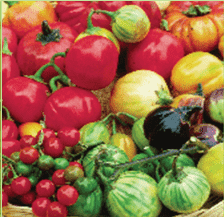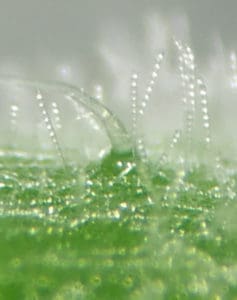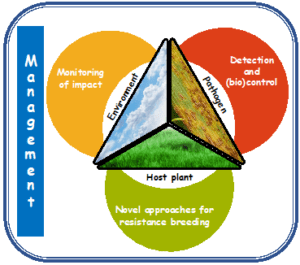NEWS
Stay updated on the latest developments in plant science policy and EPSO activities!
EPSO highlights three funding programmes supporting research and policy implementation : 1) Weave , a bottom-up, cross-European initiative by national funders to support excellent collaborative research; 2) COST, providing networking for researchers, for which you are invited to the EPSO-COST webinar on 29.4.2022 at 10 am (CET); and 3) LIFE supporting policy implementation in the fields of environment and climate . The respective briefings are updated on the Members’ Only section.
Weave is a bottom-up, cross-European initiative by national funders to support excellent collaborative research
It aims to simplify the submission and selection procedures of collaborative research proposals that involve researchers from up to three European countries or regions. Proposals go through a single evaluation procedure followed by coordinated but autonomous decision processes of the involved funding organisations.
Weave currently comprises 12 national and regional research funders from 11 European countries: FWF / AT; FNRS & FWO / BE; HRZZ / Croatia; GACR / CZ; DFG / DE; FNR / LUX; RCN / NO; NCN / PL; ARRS / SV; FORMAS / SE; SNSF / CH.
WEAVE is presented in the spring EPSO newsletter on the members only website.
COST, providing networking for researchers, for which you are invited to the EPSO-COST webinar on 29.4.2022 at 10 -11:45 am (CET)
COST is part of Horizon Europe under the Widening Participation and Strengthening the European Research Area. The COST open call aims to fund pan-European research networks in all science fields through bottom-up networking activities. Collection dates are once a year, this year on the 20.10.2022.
To develop your proposal, check the EPSO COST briefing (1.03.2022) and register to the EPSO-COST webinar with EC colleagues on 29 April 10-11.45 AM with presentations and Q&A.
Up to 70 new COST Actions are expected to be approved under the 2022 call, subject to available budget. COST does not fund research itself but only COST Actions (networking) for a period of four years
LIFE support policy implementation in the fields of Climate en environment
LIFE is the EU’s funding instrument for the environment and climate action. It is not part of the Horizon Europe programme, but under the same EU multi-annual financial framework. LIFE projects support policy implementation. Research is not the main focus but should be part of a LIFE project. LIFE projects only provide co-financing. Thus, you always need another financial source for the remaining amount.
Access the EPSO updated briefing on the LIFE Work Programme 2021 at the EPSO Members-Only Website. As LIFE Calls 2022 are expected to be published on the EC’s Funding & tender opportunities portal on 17.5.2022, EPSO will update its briefing shortly afterwards.
EPSO Members, except external Personal Members, can contact Sofia Ciravegna [email protected] for access to the EPSO Members’ Only website.
Content of the full version
Editorial
Scientists contributing to building a better Europe and world: Stop war in Ukraine! Offer support to Ukrainian scientists. Contribute to food security
EPSO activities
- Plant Health Working Group: Healthy Plants for a sustainable production – 1st meeting on 5.7.2022
- 6th Fasci-nation of Plants Day around the 18th May – join the initiative!
- EPSO Plant Science Seminar starts a second year as a feature in the Plant Science calendar
- Stick to Science campaign – Put science collaboration before politics
- Meeting of the EPSO WG Agricultural Technologies 23.11.2021
- EPSO 5th informal science – policy meeting on genome editing in Europe, online, 4.11.2022
- The Outreach and Public Dialogue Working Group welcomes your contributions
- Weave – supporting excellent collaborative research projects across borders
- Joint Call on Agrobiodiversity by SusCrop ERA-Net and FACCE-JPI
- SusCrop seminar on sustainable crop production & workshop on innovation – 10-12.05.2022
- The Future Proofed Crops Working Group will meet first in Brussels in October 2022
- EPSO workshop linking Diverse Crops, Cropping Systems and Diets for Food and Nutritional Security, 26.10.2021
Members’ news
- The Max Planck Institute for Chemical Ecology in Jena, Germany – welcome as member
- CHIC will release videos to better understand the project in 8 languages!
- Austrian initiative ‘Medicines for Future’ launches development of COVID-19 therapy
- Towards an increased efficiency of photosynthesis in field food crops within the next decade
- CropBooster-P assesses the economic, social, and environmental impact of identified strategies
- The International Barley Hub is looking for collaborators
- Discover InnCocells’ progress through its podcast and Academy events
- Engineering betalain biosynthesis in tomato for high level betanin production in fruits
- Blue light inhibits immune response of potato to late blight disease
- ASTER – Agroecology-inspired Strategies and Tools in tomato
- Grant opportunities within the Italian Recovery and Resilience Plan (PNRR) for plant science
- StressKnowledgeMap compile global knowledge on plant responses to stress
- Join the 7th International Plant Phenotyping Symposium, IPPS 2022, 26-30.09.2022
National, European and global funding
- National Research Funding Opportunities in Sweden
- National Research Funding Opportunities in Austria
- Apply to COST open call by 20.10.2022 and attend the EPSO-COST Info session on 29.04.2022
- LIFE Calls 2022 are expected to be published on 17.05.2022
Career opportunities and meetings
About EPSO
The EPSO Nutritional Security Working Group will discuss and contribute to defining new paths and solutions for resilient and sustainable production systems using innovative solutions in the food and nutrition area.
Plant-based foods have received remarkable attention during recent decades in nutrition research, due to the biological activities recognized for many classes of phytochemicals and the relevance that food nutritional security topics are finding in European countries. The availability and accessibility to nutritionally-rich food sources are hallmarks for human health and wellbeing. That is why many efforts are being directed towards both traditional and new crops.
The workshop will be carried out as a hybrid event 27 – 28 May 2022, with physical presence of a limited number of participants in Lecce / IT as well as live streaming (up to 500 participants, through the Gotowebinar platform).
To participate in Lecce, please email Marina Korn [email protected] until 29.4.2022.
To participate online, please register at the following the link until 20.5.2022:
https://attendee.gotowebinar.com/register/7690122185825291280
The meeting intends to increase collaborations between the working group members both bi-and multi-lateral. In addition, it will provide information to finalise the EPSO statement on Nutritional Security, including recommendations on R&I as science advice to policy to the European Commission as well as national authorities.
The workshop will be held 27 May (10 am – 6pm) – 28 May 2022 (10 am – 1pm).
Workshop sessions
- Improving the nutritional value of major and minor (neglected) crops, moderated by Katia Petroni
- Recovery and stabilization of primary/secondary metabolites from food matrices & side-products, moderated by Marina Korn
- Environmentally friendly and valuable alternatives to traditional food sources, moderated by Monika Schreiner
- Assessing the nutritional value and safety along food chains, moderated by Angelo Santino,
We very much look forward to welcoming you at the workshop.
Angelo Santino, Monika Schreiner & Marina Korn, Chiara Tonelli & Katia Petroni, and Karin Metzlaff
Click here to read:
Contacts: Angelo Santino (CNR, chair), Marina Korn (co-organiser)
EPSO is pleased to announce the start of its new Working Group ‘Plant Health’. It will focus on the impact of pathogens and pests onto plants and plant protection in agriculture, forestry and the natural (non-human made) environment. It encompasses the continuum from basic to applied research.
It will link for instance to our Future Proofed Crops WG regarding abiotic stress, water and nutrient use efficiency and photosynthesis, to our Nutritional Security WG on crop nutritional quality and the Tree and Forestry Biology and Biotechnology WG.
The WG will meet first time online on 5th July 2022 to discuss the draft statement on plant health and next steps.
Pls discuss this in your organisation and reply to Karin, cc Sofia and the chairs to become a member of this WG best by end April 2022 (we suggest 1-2 expert scientists per organisation interested in this subject). To enrol an expert, please provide the name, function in the institute, 1-3 keywords on the expertise and contact details. Pls confirm as well if the expert(s) will join the 1st meeting on 5.7.2022.
Interested in the other EPSO WGs?
Discuss in your organisation all EPSO Working Groups (see https://epsoweb.org/working-groups/) and let Karin know if you want to add expert scientists to the other WGs.
EPSO members start and coordinate EPSO Working Groups to collaborate on science advancement, networking, strategy and provide science advice to policy. We suggest that 1-2 expert scientists per member organisation join a WG relevant to them.
Membership in EPSO WGs is restricted to experts from EPSO Institutional members. Others can apply to become and observer of a WG
Looking forward to collaborating with you in the Plant Health WG
Beat, Tina, Maria, Gian Paolo, Andreas and Karin
Plant Health WG co-chairs: Beat Keller, Tina Romeis, Maria Jose Pozo, Gian Paolo Accotto and Andreas Voloudakis.
EPSO Executive Director: Karin Metzlaff
Click here to read: Full ‘EPSO Plant Health WG announcement’ and the ‘EPSO Plant Health Draft statement’
Contacts:
- EPSO Plant Health WG co-chairs:
- Beat Keller, Uni ZUR, CH
- Tina Romeis, IPB, DE
- Maria Jose Pozo, CSIC, ES
- Gian Paolo Accotto, CNR / IT
- Andreas Voloudakis, AUA, GR
- EPSO: Karin Metzlaff, EPSO Executive Director
- Sofia Ciravegna, EPSO Executive Assistant
Plants comprise the key component for -direct or indirect- human nutrition. Agriculture must be highly productive in order to meet the increasing demand for food, feed, fuel and fibre to support a rapidly growing global human population, as well as reach higher quality providing health benefits.
Because of the large areas devoted to agriculture and the large demand of resources, the technologies used in the production and protection of plants are highly relevant for the global environment.
Pathogens and pests compete with humans for plant-based food. The impact of these biota onto plants and plant protection in agriculture, forestry and the natural (non-human made) environment is the main area for the Plant Health (PH) working group (WG) of EPSO.
To sustainably improve plant health specifically in European agriculture, the Plant Health WG proposes to focus on three tasks:
- To develop novel, sustainable pathogen & pest control methods for plant health protection
- To detect pathogens & pests that affect plant health and reduce crop yields
- To develop ready-to-apply pathogen & pest management technologies and disseminate them to end users.
Raising the societal awareness on how plant health protection could contribute to food security, sustain farmers’ income, protect biodiversity and reduce impacts on the environment, ensuring a high-quality product and boosting economic development is a major challenge. This requires a joint effort and engagement of academia with industry, farmers, citizens and policy makers.
This draft statement will be discussed at first meeting of the new EPSO ‘Plant health Working Group online on 5th July 2022.
Looking forward to collaborating with you in the Plant Health WG
Beat, Tina, Maria, Gian Paolo, Andreas and Karin
Plant Health WG co-chairs: Beat Keller, Tina Romeis, Maria Jose Pozo, Gian Paolo Accotto and Andreas Voloudakis.
EPSO Executive Director: Karin Metzlaff
Click here to read: Full ‘EPSO Plant Health Draft statement’
Contacts:
- EPSO Plant Health WG co-chairs:
- Beat Keller, Uni ZUR, CH
- Tina Romeis, IPB, DE
- Maria Jose Pozo, CSIC, ES
- Gian Paolo Accotto, CNR / IT
- Andreas Voloudakis, AUA, GR
- EPSO: Karin Metzlaff, EPSO Executive Director
- Sofia Ciravegna, EPSO Executive Assistant
On 4 November 2021 EPSO member-scientists and policy makers from seventeen countries across Europe held the fifth informal meeting to assess the situation for research and development on New Plant Breeding Technologies (NPBTs) after the ruling of the ECJ in July 2018.
They exchanged views on the current situation of genome editing (GE) in Europe and possible next steps to enable Europe to better address climate change, achieve food and nutritional security, and establish a sustainable agriculture in Europe and world-wide. Such steps should bring the discussion forward on the EU legislation and facilitating potential flagships. The meeting was held under Chatham House Rules.
The next meeting will be held in May 2022.
EPSO offers to collaborate with policy makers to develop an appropriate future-ready regulation to enable the European public sector, small- and medium-sized companies and farmers to contribute more comprehensively to food and nutritional security and to use all available tools to reduce the environmental impact of agriculture. Notwithstanding the technical option retained, EPSO supports a science-based revision of the present European legislation establishing a more proportionate product-based risk assessment. EPSO is also willing to contribute to the societal debate on genome editing and to communicate in a fact-based and yet accessible manner about innovative plant science and its societal role.
Ralf Wilhelm, Jens Sundstrom, Alan Schulman and Karin Metzlaff
Contacts:
- Ralf Wilhelm & Jens Sundstrom, EPSO Chairs WG Agricultural Technologies
- Alan Schulman, EPSO President
- Karin Metzlaff, EPSO Executive Director



